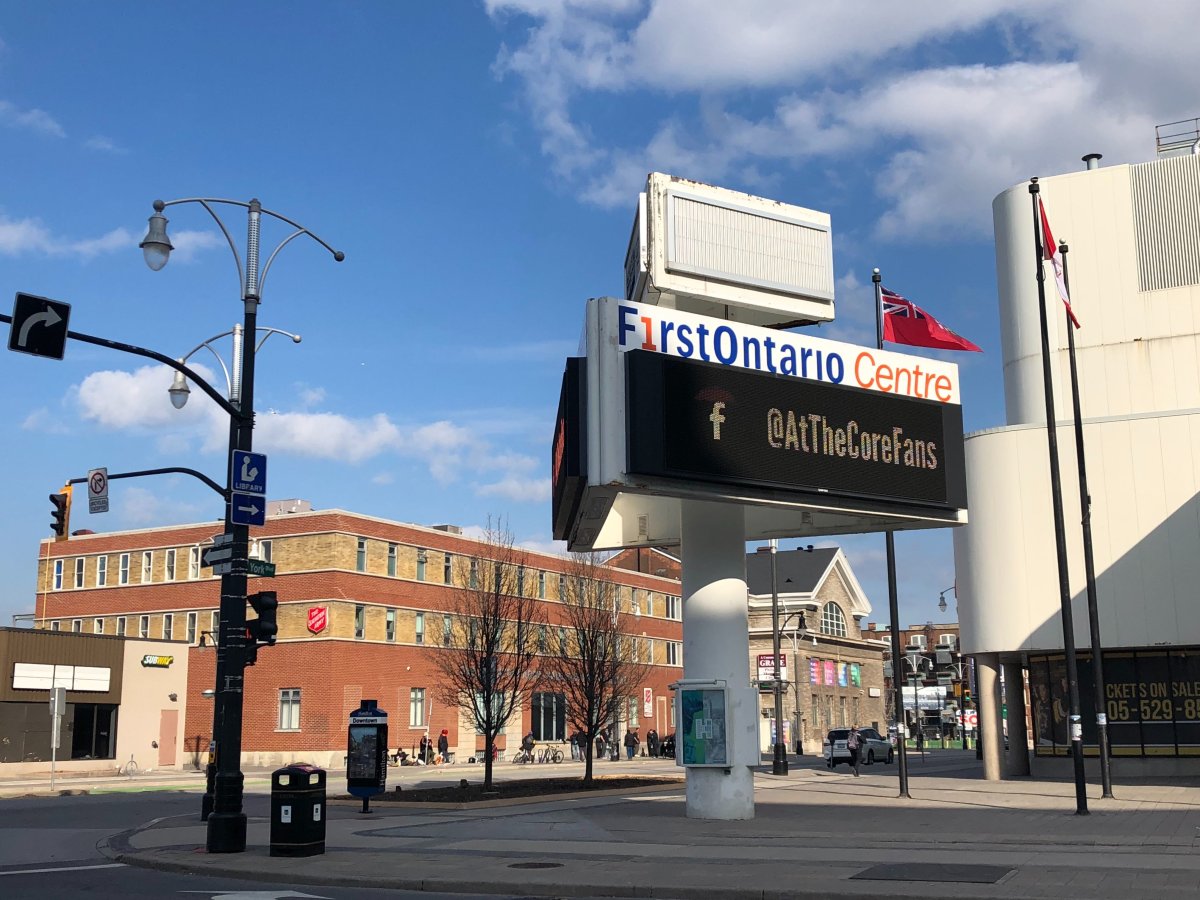Advocates for Hamilton, Ontario‘s homeless citizens are urging the city to open up public spaces and more hotel rooms for those who have nowhere to go to self-isolate in the midst of the COVID-19 pandemic.

The city has set up isolation sites for those who have symptoms of the virus, but Keeping Six, the Hamilton Harm Reduction Action League and the Hamilton Social Medicine Response Team say there needs to be more support for people who may not be symptomatic but still need to practice hygiene and rest in a safe space.

Lisa Nussey of Keeping Six says it’s a necessary step to stop the virus from spreading among those who can’t physically isolate themselves, or easily practise social distancing.
“We are quickly running out of time before infections take hold in populations that don’t have the set possibility to spread out,” said Nussey. “There are so many spaces in the city right now which are shuttered because of this epidemic — so there is physical space.”
Since issuing a press release on Tuesday about the need for these spaces, Nussey said they’ve heard from many community organizations that are interested in helping, including churches and schools.
She added that other places that have been forced to close due to the pandemic could also offer that space, including the city’s central entertainment venue.
“To me, FirstOntario Centre seems like a reasonable place because it is so large. We’re not saying open the whole stadium and let … everybody be in whatever place they want — that becomes very unmanageable — but there could be a way to open sections of a large stadium so that people are actually afforded an opportunity to distance themselves from one another.”

Paul Johnson, the director of Hamilton’s emergency operations centre, said they’re looking at a “phased approach” to providing security for homeless residents in need.
“We understand that a number of the normal public spaces that people would use for washrooms or hygiene access are now closed,” said Johnson. “As we need to scale up, we will do that.”
He said one of the major obstacles would be staffing those facilities.
Nussey acknowledged that staffing is a significant issue, but said this is not a normal time and all options need to be on the table.
“It’s not that we’re ignorant of how difficult this is to do, but what we’re saying is that it just has to be done, no matter how difficult it is, in order to prevent the spread of this virus.”
- Canadian man dies during Texas Ironman event. His widow wants answers as to why
- ‘Shock and disbelief’ after Manitoba school trustee’s Indigenous comments
- Several baby products have been recalled by Health Canada. Here’s the list
- ‘Sciatica was gone’: hospital performs robot-assisted spinal surgery in Canadian first
Some progress has been made, as those on the front line of Hamilton’s shelters work to curb the risk of the pandemic spreading among those who can’t self-isolate.
Dr. Kerry Beal, the lead physician of Hamilton’s Shelter Health Network, said they’ve begun quick-turnaround testing of those within the shelter system that have symptoms of COVID-19.
“If someone is identified coming into shelter who may be a potential case, if they are well enough, we isolate them in the shelter,” said Beal. “We go and we test them to determine whether or not they would be appropriate for the isolation area.”
As of Wednesday afternoon, there have been no positive tests.
Another potential mitigation method proposed by Keeping Six and fellow advocates is opening up more hotel rooms.
The shelter network already has access to some hotel space if there is overflow within the system, but advocates say the pandemic situation means there’s a need for more beds and more rooms.
“It would be appropriate to put somebody in a hotel if they weren’t necessarily positive but they were waiting out their 14 days,” said Beal.
It’s also crucial that those isolation spaces are able to support those with substance use disorders, which was a central priority during a meeting between the city and the Shelter Health Network on Wednesday morning.
“A lot of people out there are basically saying, they’re not going to present themselves for testing because they don’t want to be put into isolation,” said Beal. “And they don’t want to be put into isolation because they have a substance use problem, and they’re not going to be able to get their substances. So we’re looking at how we can make sure that people are not going into withdrawal when they get into isolation.”
Toronto has recently announced that it’s rolling out new measures to prevent community spread within its shelter system.
It comes after at least two people in Toronto’s shelter network have been diagnosed with COVID-19, although the city said those two cases aren’t connected and there remains no evidence of an outbreak in the shelters.
Hamilton has seen its first death caused by COVID-19. An 80-year-old woman in a Stoney Creek nursing home died from the virus while in isolation at St. Joseph’s Hospital. An outbreak was declared at that nursing home after a second resident was also diagnosed with the virus.
Questions about COVID-19? Here are some things you need to know:
Health officials caution against all international travel. Returning travellers are asked to self-isolate for 14 days in case they develop symptoms and to prevent spreading the virus to others.
Symptoms can include fever, cough and difficulty breathing — very similar to a cold or flu. Some people can develop a more severe illness. People most at risk of this include older adults and people with severe chronic medical conditions like heart, lung or kidney disease. If you develop symptoms, contact public health authorities.
To prevent the virus from spreading, experts recommend frequent handwashing and coughing into your sleeve. They also recommend minimizing contact with others, staying home as much as possible and maintaining a distance of two metres from other people if you go out.
For full COVID-19 coverage from Global News, click here.








Comments